#outstanding limited series
Explore tagged Tumblr posts
Text


Yes please! 🙏
#do consider#transatlantic#cory michael smith#emmy nominations#emmys 2023#transatlantic netflix#outstanding lead actor in a limited series#outstanding limited series
25 notes
·
View notes
Text
this afternoon, the sag awards nominations. this afternoon may be the afternoon where i see louis hofmann nominated for outstanding male performance in a limited series and aria for outstanding female performance in a limited series, I CANT FUCKING WAIT
#if they don’t nominate them#im starting a fucking riot#honestly#all the light is already nominated for two awards (director and music) and I NEED THEM TO BE BOTH OUTSTANDING ACTORS IN A LIMITED SERIES#ITS MY DREAM#I NEED IT#AND I WANT BOTH OF THEM#BECAUSE THEY DESERVE IT#all the light we cannot see#louis hofmann#aria mia loberti#sag awards
3 notes
·
View notes
Note
In a hypothetical case, if wmmap has an anime and it does well, is it possible that we will have more and new merch?
Oh, if it gets an anime, even if it's complete trash, it will get some merch for sure.
#JP loves those clear files so much#that been said. most anime merch is kinda boring unless the series is a big hit#like... coasters and clear files of promotional images and such#i've always thought that the KR merch was super outstanding#while limited. wmmap got the best merch ever. we have to thank Spoon for that
11 notes
·
View notes
Text








lewis pullman as calvin evans in lessons in chemistry
primetime emmy award nominee for outstanding supporting actor in a limited series or movie
313 notes
·
View notes
Text
The Spotlight is Ours Pt. 1

Pairing: Aaron Pierre x Black Original Character
Summary: Two rising Black British stars in Hollywood. One fateful night at the NAACP Image Awards. When actress Sienna Sinclair presents the award for Outstanding Actor in a Limited Series, the winner is none other than Aaron Pierre. The chemistry is instant, the banter is effortless, and the connection? Dangerous. But in an industry where everyone is watching, some things are better left unsaid… or are they?
🔸 Warnings: Heavy flirtation, mutual pining, and the start of something messy. 🔸 Author’s Note: Welcome to the beginning of a very questionable love story.
The NAACP Image Awards were in full swing, a night dedicated to celebrating Black excellence in entertainment. The grandeur of the Pasadena Civic Auditorium was amplified by the shimmering gold and deep purple stage design, and the room was alive with applause, camera flashes, and the palpable energy of some of the biggest names in Hollywood.
Seated among the nominees, Aaron Pierre adjusted the cuffs of his custom black tuxedo, keeping his expression cool despite the slight thrum of anticipation in his chest. He had been nominated for Outstanding Actor in a Limited Television Series, Special, or Movie for his role in Rebel Ridge, a project that had tested his limits as an actor and elevated his career. Winning would be monumental, but he wasn’t the type to get ahead of himself.
As he sat waiting, his attention flickered to the stage where the next presenter was being introduced.
“Please welcome, the incredibly talented, Sienna Sinclair!”
Aaron’s brows lifted slightly as he watched Sienna Sinclair glide onto the stage, radiating effortless grace and confidence. He had heard of her, of course—the Oscar-winning British actress whose career had skyrocketed after her powerful performance in a historical drama. He had seen her on magazine covers, watched her interviews in passing, but seeing her in real life was… different.
Dressed in a form-fitting, midnight-blue gown, she exuded a kind of cool, magnetic energy. And then she spoke—her London accent cutting through the air, smooth yet commanding.
“Alright, alright. Let’s get to it,” she said, flashing a teasing smile as she opened the envelope. “The nominees for Outstanding Actor in a Limited Television Series, Special, or Movie are…”
Aaron barely heard the rest of the list. His focus was on her, the way she carried herself, how her presence seemed to pull attention like gravity.
Then—
“…and the NAACP Image Award goes to—” She paused, drawing out the suspense, her dark eyes flickering toward the camera with playful mischief.
“Aaron Pierre, for Rebel Ridge!”
The crowd erupted into applause.
Aaron blinked once before allowing a slow, satisfied smile to spread across his face. He stood, adjusting his suit with ease before making his way toward the stage, dap-ups and handshakes following him on the way.
When he reached the podium, he took the award from Sienna's hands, and for a brief moment, their fingers brushed. It was subtle, fleeting, but enough to make Aaron glance up and fully take her in.
Up close, she was even more stunning.
“Congratulations,” Sienna murmured, her voice just low enough for him to hear.
“Appreciate it,” Aaron replied smoothly, his deep voice wrapping around the word in a way that made Sienna’s lips twitch slightly.
Aaron turned toward the microphone, delivering a speech that was humble, thoughtful, and reflective of his journey. He spoke about the importance of storytelling, about the shared experiences of Black British and African-American actors carving out spaces in Hollywood, about how recognition like this was both an honor and a responsibility.
“I didn’t get here alone,” he finished, his rich voice sending a hush over the room. “To every young Black actor watching, to every kid dreaming beyond what they’ve been told is possible—we are the blueprint. And the best is still yet to come.”
Thunderous applause.
Sienna clapped alongside the audience before leaning into the mic. “And on top of all that… he’s also Mufasa.”
The crowd roared with laughter, and Aaron exhaled a quiet chuckle, shaking his head.
Sienna smirked at him. “Had to.”
Aaron gave her a look—amused, but also intrigued. “We’ll talk about this backstage.”
Sienna tilted her head, watching him as he walked off. “Looking forward to it.”
--
The post-win chaos was already unfolding backstage—cameras flashing, journalists waiting for quotes, production assistants ushering talent from one place to another. Aaron had barely had time to process the moment when he heard a familiar voice behind him.
“Well, well, look at you, Mr. Award Winner.”
Aaron turned.
Sienna Sinclair stood there, arms crossed, watching him with a smirk.
Aaron couldn’t help but let his gaze linger for half a second longer than necessary. “Didn’t expect to see you back here so soon.”
Sienna shrugged. “Had to personally congratulate you. You know, since I had the honor of saying your name on stage.”
Aaron nodded, a slow smirk tugging at his lips. “You did say it well. Very elegant.”
Sienna raised an eyebrow. “I do everything elegantly.”
Aaron exhaled a quiet chuckle. “Not doubting it.”
She tilted her head slightly. “So… how does it feel? Winning?”
Aaron glanced down at the trophy in his hand before looking back at her. “Feels good. But I won’t lie—hearing my name come out of your mouth might’ve been the highlight of the night.”
Sienna sucked her teeth, shaking her head, though there was something in her expression—something that said she wasn’t entirely unaffected by him.
“You’re full of it,” she teased.
Aaron leaned in slightly. “Am I?”
Sienna, ever the quick-witted one, smirked. “Yeah. And I can’t believe you let me call you out in front of everyone like that.”
Aaron shook his head. “The Mufasa jingle?”
Miracle nodded. “You knew I had to bring it up.”
Aaron narrowed his eyes playfully. “You enjoyed that way too much.”
“I did,” she admitted, her smirk widening. “And let’s be real, you love it. Don’t lie, you’ve sung it to yourself at least once.”
Aaron rubbed his jaw, his expression unreadable. “I’m not dignifying that with a response.”
Sienna laughed, tilting her head. “It’s alright, Aaron. Aaron Pierre, that’s Mufasa—it’s got a nice ring to it.”
Aaron exhaled a low chuckle, shaking his head. “You know, it’s unfair how much pleasure you’re getting out of this.”
“Oh, trust me, I could get pleasure out of a lot more than that.”
Aaron’s jaw tightened slightly, the air between them shifting from playful to something heavier.
Sienna’s eyes held his, dark and teasing. “But I’ll let you enjoy your win first.”
Aaron huffed a laugh, nodding. “So generous of you.”
She smirked. “You’re welcome.”
The moment stretched just a second longer than necessary—his gaze still locked with hers, her breath just a little deeper.
From across the backstage area, a production assistant called out to Sienna, signaling that she was needed elsewhere.
She exhaled, shaking her head as she took a step back. “Well, Mufasa, I’ll see you around.”
Aaron tilted his head slightly, watching as she turned and walked away, her presence lingering even after she disappeared from sight.
“Yeah,” he murmured to himself, a small smirk playing at the corner of his lips. “You will.”
164 notes
·
View notes
Text
CONGRATULATIONS, AARON ! 🎉
Aaron is nominated for TWO NAACP Image Awards
Outstanding Character Voice–Over Performance – Motion Picture for Mufasa: The Lion King
Outstanding Actor in a Limited Television (Series, Special or Movie) for Rebel Ridge
Rebel Ridge receives TWO additional nominations, besides Aaron's:
Outstanding Limited Television (Series, Special or Movie)
Outstanding Stunt Ensemble (TV or Film)
Genius: MLK/X receives SEVEN nominations, including a DOUBLE NOMINATION
Outstanding Limited Television (Series, Special or Movie)
Outstanding Actor in a Limited Television (Series, Special or Movie) -- Kelvin Harrison Jr. as Martin Luther King Jr.
Outstanding Supporting Actor in a Limited Television (Series, Special or Movie) -- Ron Cephas Jones as Elijah Muhammad
Outstanding Supporting Actress in a Limited Television (Series, Special or Movie) -- Jayme Lawson as Betty Shabazz
Outstanding Soundtrack/Compilation Album
Outstanding Directing in a Drama Series -- Marta Cunningham for “Protect Us” & “Who We Are”
104 notes
·
View notes
Text
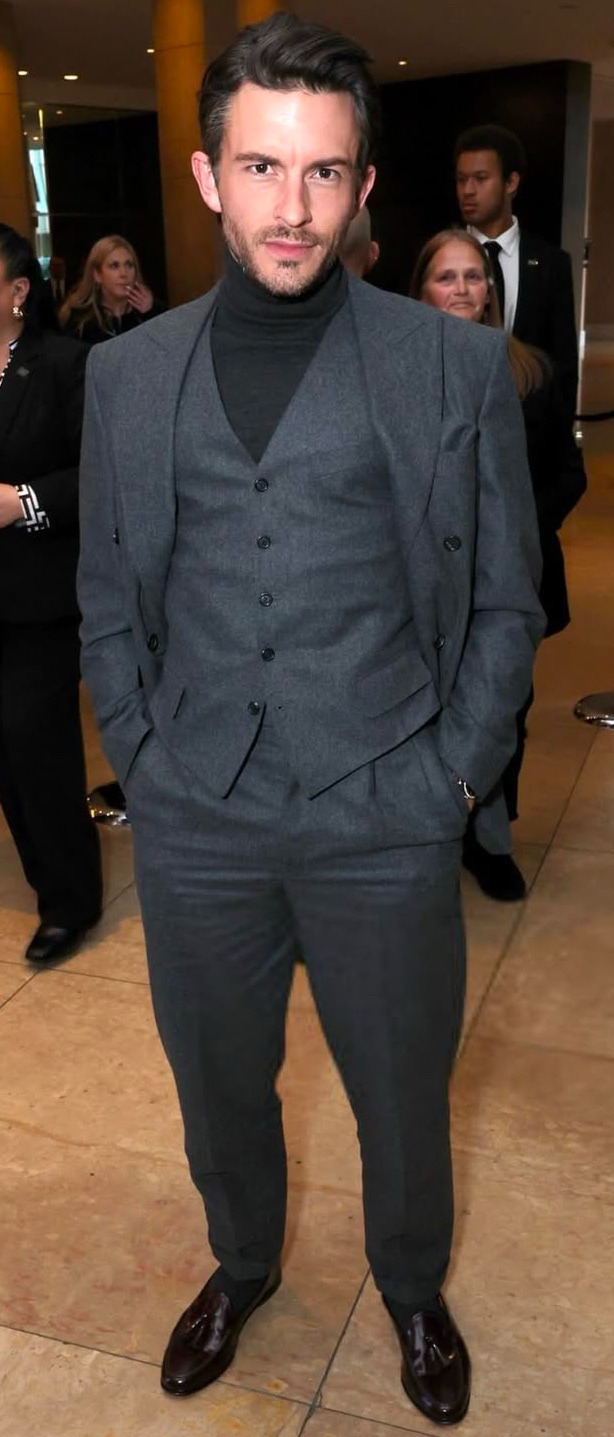






Jonathan Bailey at the GLAAD Media Awards in LA, January 2024 where Fellow Travelers won Outstanding Limited Series🏆♥️🏳️🌈.
📸: GLAAD
#jonathan bailey#wicked#jonny bailey#wicked movie#Fiyero#lgbtq+#fellow travelers#Matt Bomer#lgbtq+ community#british actors#british men#beautiful men#gorgeous men#most talented cast#most deserving series!#jelani alladin#allison williams#ron nyswaner#Robbie rogers#glaad#GLAAD media awards
69 notes
·
View notes
Text
PODCAST: Top drama, comedy, limited series contenders, plus Nicholas Galitzine and Taylor Zakhar Perez | The Awardist
We're kicking off the 2024 Emmys season with our thoughts on likely nominees for Outstanding Drama, Comedy, and Limited/Anthology Series - Awardist host Gerrad Hall and EW TV Critic Kristen Baldwin break down the top contenders. Plus, Gerrad chats with Nicholas Galitzine and Taylor Zakhar Perez, stars of the hit TV movie and contender Red, White & Royal Blue.
#red white and royal blue#rwrb movie#rwrb#taylor zakhar perez#nicholas galitzine#tzp#ng#the boys#cast#podcasts#interviews#Spotify#Emmys fyc
310 notes
·
View notes
Text
Aaron Pierre on winning his NAACP Award
Aaron Pierre speaks on his NAACP Image Award win for Outstanding Actor in a Limited Television (Series, Special, or Movie) via Instagram:
“Wow. I was on set working when I received this beautiful news. My heart is full. Thank you NAACP Image Awards for this incredible honor. Thank you to the NAACP members who voted for me. Thank you to everyone who poured themselves into the making of Rebel Ridge. The magnitude of this honor is not lost on me. I will continue to commit fervently to my craft. Beyond grateful. Glory to God.”

56 notes
·
View notes
Text
'I'm in Love with the Villainess' Anime - Episode 1 Review
An astounding and hilarious first outing for the series with the power to revolutionize Yuri
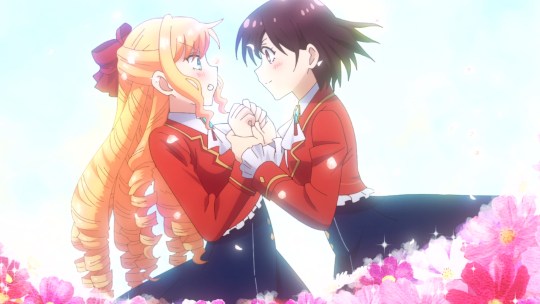
We are finally here, the long-awaited and much anticipated first episode of Platinum Vision’s I’m in Love with the Villainess anime aired on Tokyo MX and is streaming everywhere outside of Asia with a plethora of dubbing options, including English, on day one on Crunchyroll.
The first outing covers most of the events of the light novel’s first chapter, or the first three chapters of the manga, at a rapid but steady and not overwhelming pace. At this rate, the anime should be able to cover much of the series’ first arc, or the first two out of five books, in a single cour. Perhaps a bit less, depending on which of the story’s various adventures it elects to include. This is an exciting possibility, to be sure, as the story is a character-driven, socially mindful, and expertly written and, despite its fantasy setting, an exceptionally relevant tale of romance, socio-economic inequality, and of course, queerness.
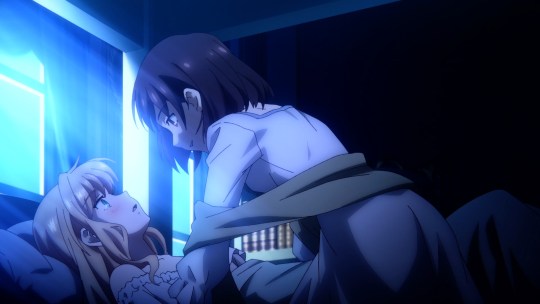
While the first arc of Villainess is a triumph, it would be a shame not to see at least some of the developments from the extra chapters that lead into the second story, like (spoilers for the end of volume 2) Rae and Claire’s wedding and their adopted twin daughters May and Aleah. If we are lucky, perhaps they will appear in the final episode or, dare to dream, a second season (end of spoilers).
Now, onto the show itself. For those who, for whatever reason, have not read Inori’s masterpiece, I’m in Love with the Villainess follows Rae Taylor. A salary worker who dies and is reincarnated as the protagonist of her favorite otome game, Revolution. However, Rae has no interest in any of the game world’s three eligible royal bachelors and has eyes only for the game villainess Claire François. Armed with exceptionally magical ability, Rae sets out determined to secure a happy ending for her beloved Claire against the coming revolution and perhaps win her heart in the process.
Now, the opening of I’m in Love with the Villainess is the series' weakest moment in all mediums, which, considering episode one’s outstanding quality, only highlights just how superb the Yuri masterpiece is as a whole. Even with its need to establish the setting, characters, and premise of the series, the premiere managed to be an excellent introduction and set the bar high with lots of laughs, entertainment, and service between our two leads.
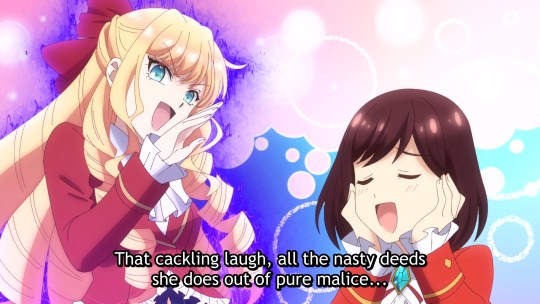
I watched the Japanese audio, and Yu Serizawa and Karin Nanami are fantastic in these roles, with Serizawa playing up Rae’s teasing adoration and borderline masochism at full blast, and Nanami explicitly giving voice to Claire’s arrogance and frustration. She even manages to deliver a perfect Ojou-style laugh to seal the character’s elite status and lean into the show’s use of otome tropes. And having the leads sing the excellent opening and ending themes is just icing on the cake.
Speaking of tropes, while Ironi’s original work is a genre-defying masterpiece that broke the Yuri mold, it is never afraid to play with the genre’s iconography and its otome game setting. Every other scene had another allusion, including to the book’s cover. As always, I am likely overeager to see connections, however intentional they may be, but the academy’s halls harken to otome staples, the bells and strings of the first scene's soundtrack conjured blistering memories of Strawberry Panic (perhaps a sacrilegious comparison to make but I digress), and even an areal shot of the campus was another check mark on my “Scenic Yuri” theory.
Now, as mentioned, I’m in Love with the Villainess has to establish the groundwork here, and narratively, these are the weakest moments, often direct exposition, with a few exceptions like Rae’s conversation with her roommate Mash about maintaining Claire’s attention. The narration is at least accompanied by relevant and creative, if perhaps limited, animation. But to their credit, these moments are succinct, existing only as long as they have to in order to provide the necessary information and get out of the way for what matters most: the characters.
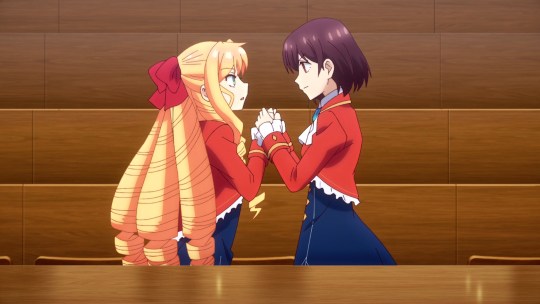
Rae and Claire are front and center from the very get-go, and there is little time wasted in showcasing Rae’s intense bottom energy or establishing Claire’s elitism and bewildered anger towards Rae’s excitement in the face of Claire’s carefully calculated cruelty. It is a montage of silly and fun competitions between the two that had me laughing and smiling all the way through, as the Yuri was present in full force, and gives glimpses at the mutual obsession the women have for each other that will soon blossom into a wonderful romance.
These early story beats have a light tone and focus on the bullying, teasing, and rivalry between Rae and Claire, a dynamic that previously and understandably made a subset of readers somewhat uncomfortable. However, assuming the anime unfolds in a similar manner to the manga and light novels, the narrative will explore meatier, heavier subject matter and a far deeper lesbian romance, all without losing its sense of fun and adventure. The next episode or two will be incredibly telling - as the source material is perhaps the most profound and forthright depictions of LGBTQ identity in Yuri, and that all starts with a pivotal conversation that, if it is included, will be coming up shortly.
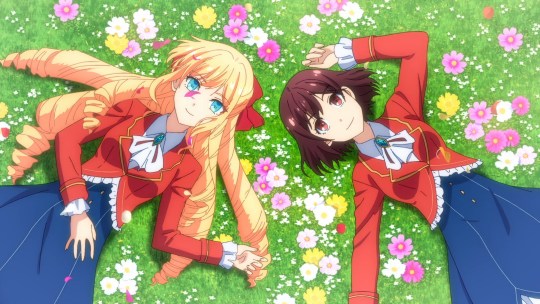
Overall, I am incredibly excited for this series. The first episode is everything I had hoped for out of an adaptation of one of my favorite works of all time, save the animation, which is average at best. While there is a lot more to see, and we will have to wait to know if I’m in Love with the Villainess lives up to its incredible potential and source material, I am extremely hopeful. We have one of the funniest, most thoughtful, and queerest works of Yuri transformed into a stunning anime project unlike anything that has come before and offers the chance at not just a new Yuri “gateway” but to continue the work of its source material in revolutionizing the genre.
Ratings: Story – 8 Characters – 10 Art – 5 LGBTQ – We shall see… Sexual Content – 3 Final – 8
I'm in Love with the Villainess is streaming on Crunchyroll with English sub/dub.
Review made possible by Avery Riehl and the rest of the YuriMother Patrons. Support YuriMother on Patreon for early access, exclusive article, and more: patreon.com/yurimother
#yuri#Reviews#girls love#lgbt#anime#i'm in love with the villainess#ILTV#lgbtq#gay#gl#queer#lesbian#manga#yuri anime#gl anime
630 notes
·
View notes
Text
Every aspect of this show deserves more than just to be considered tbh









🙏 🤞 ️ 🙏 ️ 🤞
#do consider#transatlantic#emmys 2023#emmy nominations#transatlantic netflix#outstanding music composition for a limited series#outstanding period costumes for a limited series#justine seymour#transatlantic soundtrack#just collecting these now
13 notes
·
View notes
Text

Jonathan Bailey has been nominated for Outstanding Supporting Actor in a Limited or Anthology Series at the Emmys. Ceremony will be held on September 15.
117 notes
·
View notes
Text
Jodie Foster wins the Emmy Award for Outstanding Lead Actress in a Limited or Anthology Series or Movie for her role as Liz Danvers in TRUE DETECTIVE: NIGHT COUNTRY


#true detective#true detective night country#tumblr#tv and film#tv and movies#film and tv#film and television#tv#tv shows#2024 emmy awards#2024 emmys#jodie foster
88 notes
·
View notes
Text
SOTUS Review: Engineering the Bridge To BL
I'm not exactly a sucker for teen dramas. Miss me with Gossip Girl and Pretty Little Liars. Even less soapy shows like The OC or Dawson's Creek that I checked out because of their critical status in the genre were not shows that I felt compelled to finish after watching a few episodes. However, teen dramas were a rare space in media where queer characters were allowed to exist as secondary or tertiary characters, so in my young gayhood I searched amongst less popular shows for gay storylines like in Canada's Degrassi. I binge-watched Australia's Dance Acadamy until they killed off the gay character and sought out lists about groundbreaking shows from before my time like My So-Called Life.
The latter is not simply exceptional for its gay representation but for aiming higher than its teen soap peers for realist complexity in its characters. Later, shows like Freaks and Geeks and the UK's Skins would take up that torch, then Friday Night Lights, which had the genius to bring in the institution of American football culture in the South of the the US to ground its commentary on American racial and economic politics. Norway's Skam arrived in 2015 using the "Russ Bus" tradition for similar purposes--and used the strength of its writing to depict a globally celebrated queer story the same year as SOTUS. These elevated coming-of-age teen dramas I count among my favorite series ever in any genre.
I bring up all this TV history because I found no review yet that adequately conveys SOTUS's equivalent storytelling goals and prowess, nor do they fully indicate that SOTUS is one of the most compelling BLs to this day. Historically important, they read, but mediocre production values, primarily for straight women and homophobic, with a hazing setting that might be triggering for viewers, all implying its a relic of a less enlightened time in BL history that later shows will improve upon. While I'd recommend reading them to learn more about the history of the series that I'm less interested in covering here, these are not exactly rave reviews. What a surprise to begin the series and witness right out of the gate precision, complexity, and depth to its queer depictions that's equal to any Thai BL that followed in its groundbreaking wake.
The series manages to engineer (wah wah) bridges to blend the naturalistic elements of those other elevated teen drama precedents with the tropes and styles that populated Thai BL novels (like the pink milk from 2Moons2) and will define Thai BL series in the years to come. In Thailand, the series Love Sick came first in its BL focus, but, as lovely as Love Sick is, it sprawls across flatter characters in its focus and fails to celebrate the breadth of queerness in some harmful ways. On the other hand, SOTUS, in pacing, casting, characterization, and theme development, links BL to a plot-driven Western style and decidedly queer perspective. There's a reason it was the show to begin the more intense global interest in BL series.
Below the cut, you'll find my review about the qualities that made SOTUS so outstanding to me.

SOTUS initially struck me with the tightness of its dialogues and cuts, especially compared to many other Thai BLs that I've seen, which have a bawdy theatrical spaciousness in their tempo, more in line with broad comedy or soap opera, telenovela, and Thai lakorn. Not so in SOTUS. It gives time enough for its actors to emote but orients toward storytelling precision. Plot-forward Thai BL comparables I've seen so far might be Not Me or Moonlight Chicken. Unlike those series, SOTUS won't be any cinematography nerd's dream, clearly limited by its budget in this matter, but it works hard to keep the limits of a small budget from distracting. The cheaply licensed scoring music, for example, is surprisingly effective, its repeated pulsing dread adding to the momentum ignited by the SOTUS initiation of the freshman at Thai universities.
Senior year of high school, I selected universities for application based on my fear of hazing. No fraternities near campus for me. The gendered organization and reputation for homophobic cruelty were existential threats to me as a closeted teenager. For many gay men, including myself, frat houses and initiation ceremonies were also sites of homoerotic fantasy. Thus is the duality of gay experience.
The Thai hazing context differs from the US (no gender segregation, for example), but the series mines the same psychological tension between danger and eroticism with its controversial use of the real-life SOTUS hazing induction system--the abbreviation stands for Seniority, Order, Tradition, Unity, and Spirit--to ground its queer romance. The actual implementation of it at Thai universities has more issues than the show depicts and, while the series' hazing is a form of bullying that can trigger some, the mildness of the abuse depicted ought to be stated, especially when compared to American ideas about hazing abuse and queer media's depictions of homophobic violence. SOTUS portrays shouted verbal instructions and physical endurance trials as the means of degradation, with no physical violence and reprimands with consequences when its believed seniors have disrespected their charges or put them at risk.
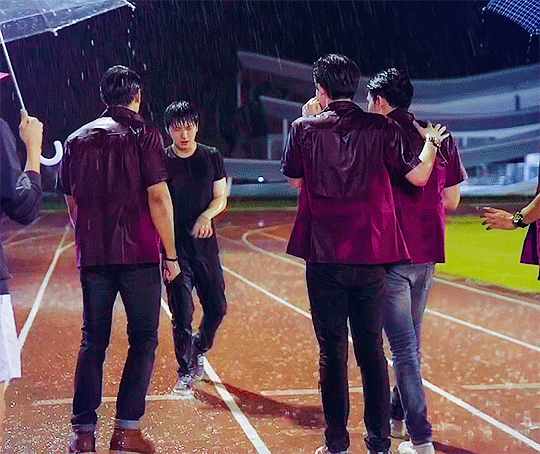
Rather than a critique of the SOTUS system itself, the system provides the organizational hub for the series' broader societal commentary, and itts treatment elevates the show to the likes of Friday Night Lights or Skam. Jane Austen's Pride & Prejudice title was taken from a line in Fanny Bruney's Cecilia about the two faults being both the cause of miseries and the reason for their termination. The series treats the SOTUS system and everything else within in the same manner: with complexity rather than binary keep-it-or-leave-it moralism. The S.O.T.U.S. values parallel the confines of a deeply imperfect society that when seen as strictly authoritarian pass down rules and pain from the elder generation to the the next. However, when viewed and practiced as the series encourages by the end of its story through a more nuanced understanding of the Asian filial philosophies at play, the values of seniority, order, tradition, unity, and spirit also invite compassion and affinity flowing in both directions across the generations.
The slowly emerging slight but significant age-gap romance between righteous freshman Kongpob and head 'hazer' Arthit is the central device for this exploration, but every element and scene, from the side couples to the food orders, develop our sense as viewers of the social order that the show wants to address. And the scenes move like well-lubricated assembly-line machinery toward their final purpose. It's obsession-inducing.
Despite the machinery of SOTUS's pacing, it delicately fashions its character and an environment gently permeated by homophobia and misogyny. Celebratory moments occurred to highlight themes without drawing attention to themselves, heterosexual coupling and marriages, for example, or a classmate coming out. Slurs surfaced casually, too, and old-fashioned masculinities were performed not as major plot points, spectacles of violence, or lessons for characters to immediately learn from, but to illustrate how inherited ignorance and constraints bear down almost invisibly on the characters. No one was demonized or ostracized for their ignorance, not because the writers view their actions positively but because they view their ignorance as a product of systematic failings, failings each generation can and will attempt to improve upon as they inherit the reigns. No one generation will make it all perfectly right. They are only human.

You can feel that humanity in the way the characters are written. All of the characters are distinguishable and interesting. They're written well and performed with heart. We have actual girls just chilling and being friends in a BL series, which was historically novel. Ingenues and horny girls and shy lesbians. The guys are recognizable guys, which is another feature Thai BL does exceptionally well. There are some dorks, some bros. The best friend in the freshman group is shy with strangers but open with his friends and fierce on the basketball court. I've known people like these. They are characters that are broad enough to recognize from a distance (or less screen time) but not simple stereotypes.
Then, on top of this you have the casual trans, gay, and nonbinary inclusion of bit parts and side characters that, to this day, only Thailand is doing in its shows to this extent. Its just impressive to see that their BL industry started off from the get-go at this level. But in SOTUS its not simply casual inclusion, either. These characters, unlike comparable characters in Love Sick, delineate moments of queer kindness that blur the understood hierarchical order of the initiation system and the heteronormative order holding our romantic leads back. In subtle ways they offer queer guidance and a model to Kong on his journey.

Then there's Kongpob and Arthit at the queer center of it all. Ugh! These two characters! These two performances! In Singto's watery sphynx-like eyes, in Krist's clinched jaw, in the electrified space between their bodies that the characters must restrain themselves against crossing, these are the heights of longing the romance genre can reach at its peak. There's an inner pain in these characters. That pain is old-school romance and its old-school queer pain.
I've read complaints about the physical intimacy in this show that I realize after watching the series are ignoring the characterizations of repression and inexperience that impact every interaction between Art and Kong, even their kisses. They aren't on the het timeline, instead having their first kiss and relationship in college, which is why SOTUS aligns with the teen drama genre so well despite its university setting. The greenness of their physical affection (we see it grow more competent and comfortable as the show progresses), however, belies an emotional chemistry that's intense, erotic, and intimate. Many more explicit BL scenes feel tame compared to Arthit grabbing Kong's shirt in rage or whispering in his ear in front of a waiting taxi.
I'm looking forward to SOTUS S and its Our Skyy episode to see more about KongArt's partnership, because their characters resist the seme/uke categorization of the BL genre they emerge from (which are also basically the stereotypes of top and bottom that gay men placed on themselves lol). Their ages and behaviors are reversed from the expected, first off. Kong, the younger, pursues, making him technically the seme and Arthit the uke, character definitions that also indicate sexual preferences of top and bottom. This wasn't unheard of in BL texts from what I've read, but less typical. Then there's the matter of Arthit being the one who initiates physical affection, partly due to Kong's regard for his challenges with internalized homophobia. Apparently, even the pronouns used between the pair are an intimate negotiation rather than an accepted order, returning us to the more complex ways the S.O.T.U.S. acronym can be enacted.
Plus, Kong's played by Singto with impressive power and confidence that's still soft-spoken, slippery, sibilant. To my trained eyes, its a character with mannerism and speech that are legibly gay. Not so legible that all his peers will notice, but he's clockable for queer eyes and worrisome for those afraid of deviation from the norm. For me, this is Thailand's biggest BL breakthrough (and its persisted down this path*) because, for many in the LGBT+ community, challenges begin well before anything to do with sexual attraction.

Gender deviance is the key issue. I was teased by a classmate at 8, well before I had a sexuality, that when I walk I move my hips like a f*gg*t. Don't worry. He wasn't totally wrong. I have a killer strut and I own it now. His antagonism wasn't about who I liked; it was my swish, my non-masculine behaviors. The hatred of gender deviance (and its misogynistic reasoning) is the underlying bogeyman for much of homophobia. Even plenty of men who are perfectly happy to have sex with men, at least where I live in the US, take issue with effeminacy. (Try finding the most overt lesbians on tv outside of OITNB, too!) That applies to audiovisual media, too. Unless comedic, consumers have tended to be more excited about queerness when the bodies and expressions appear in-line with gender expectations. The power of Thai BL and Singto's performance of Kong is how it opened space in the market and audience's minds to take queer affects seriously in young adult romance.
It's no surprise, then, that Kong forges friendships with the characters who are overtly LGBT during the series. The associations made between Kong and the fullness of the LGBT spectrum provides a more complex context for the show's choice to include him expressing the BL trope of 'only gay for you.' While it's a harmful concept broadly, the show seems to be using it subversively. How much more regressive it would've felt coming from Arthit! With Kong and all of his queer associations, it plays as the words of a gay romantic. With the diversity of coming-outs and identity-naming we now have in BL, Kong's moon-eyed statement made on the night his boyfriend comes out for him holds less of a harmful influence on the whole.
Context is just as important to the oft-critiqued scene where Kong says that he'll make Arthit his wife. Based on what I'd read and how impactful and problematic people felt it was, I thought the statement had been a romantic declaration late in the series. Imagine my surprise when it occurred in the first episode as an attempt by Kong to disrupt the patriarchal power of the seniors. Rather than illustrating the show's belief about gay relationships being the same as straight relationships, the scene points to the patriarchal assumptions the series intends by its end to disrupt. The exchange gets reenacted when the freshman decide to act it out at the faculty beach outing for everyone. The seniors interrupt, and the freshman fear they're about to be punished for disrespecting their elders only to find out they're being invited to finally celebrate their inclusion into the faculty. It's denied fruition as a tool to dis-empower and a true testament of Art and Kong's relationship.
It's at the beach where the freshman are given their gears, one of the many examples of how the series used symbols with significantly more depth than the copy-cats that tried to make bank by using the exact same motifs later. The proceeding BL engineers owe not a debt but an apology to SOTUS. The engineering faculty fit perfectly with the show's questions about systems and how individuals fit into them. We have these gears, which could simply be cogs in a machine that forces you to fit in and lose your humanity, but SOTUS envisions the gear as a heart, something unique, attempting to find its place and fit its grooves within a greater purpose. Its a symbol of authentic belonging.

The pink drink, which could've simply served--and has served in other series since--to be a symbol of pink gay girly tastes, is more fully used to emphasize Arthit's stubborn desire for familiarity, his inexperience (in trying other drinks), and a certain childishness in his preference for sweetness, a childishness that humanizes him to his freshman paramor. A trade even occurs with the drink, shifting all these meanings onto Kongpob as he begins to face his own prideful assumptions about his own righteousness.
Beyond all the English teacher symbolism and queer value, though, SOTUS is just the kind of well-told romance that will make you swoon. Despite a low budget and simple plot, its performances, editing, and most of all its script mesmerize. People shouldn't watch it as a history lesson. Its too entertaining to be relegated to that. Labeling it as simply historically important doesn't do it justice.
SOTUS stands tall among teen dramas, a literary work in a genre that doesn't require those heights; SOTUS stands tall among queer media peers, paving new lanes for queer storytelling and performances to walk down; and SOTUS stands tall among its BL peers. Clearly many of the greats in Thai BL, like 1000 Stars, Bad Buddy, and Until We Meet Again, aim to evoke their predecessor, more out of love and awe than an apology (as has been suggested by others). The ways they differ seem to be additions and diversification of queer narratives rather than a critique. SOTUS is simply one of those Great Stories. It inspires binging, revisits, investigations, and, most importantly, the biggest feels. Watch it now if you haven't. Watch it again if you have. Its not a piece of history. Its the kind of story that doesn't get old.
*Thank goodness for LITBC bringing Korea some overtly gay characters. Japan's got a few options--KENJI!--but not enough for my liking yet. I haven't seen enough of the other country's output to make a judgment.

Tagging @dropthedemiurge for being the biggest supporter of my new-found SOTUS obsession and @respectthepetty for the petty watch that got me over my lack of motivation to watch this series! Petty was half-joking but also so right about the kink undertones to this relationship!!!
There are certainly more versed BL history experts so feel free to let me know about any mistakes I made with my history! I'm just a broad and casual tv history and queer fiction and history fan tryna share my new-found BL joy.
#sotus#sotus the series#kongart#singto prachaya#kristsingto#krist perawat#took me a whole week to put this all together but it was so worth it#I love this series so much#Now i can finally let myself watch SOTUS S!!!!!
81 notes
·
View notes
Text








jonathan bailey as tim laughlin in fellow travelers
primetime emmy award nominee for outstanding supporting actor in a limited series or movie
258 notes
·
View notes
Text
Here's the conclusion to the longest atla meta I ever wrote (about platonic love in the show) for all the old and new fans coming into the fandom (def spoilers):
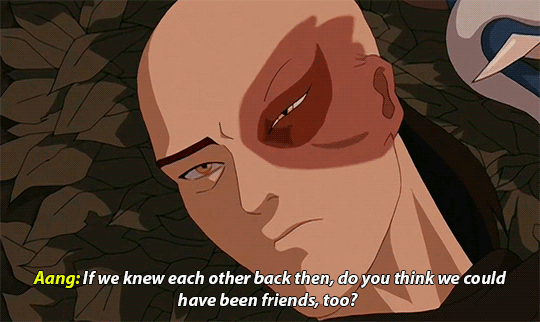
"Ideally, within the morality of the series (at least as it appears to us with no regard for whatever limits or self-censorship occurred due to its era of production and child-friendly requirements), “friends'' are maintained alongside romantic partnerships. Both Zuko and Aang’s separate romantic relationships blossom within the same episode that they declare their “friendship.” In fact, a vital plotline is the development of Zuko’s relationship with Aang’s romantic interest. While anyone in the fandom is well aware of the popular interpretation of romantic affection between Zuko and Katara because of their shared narrative, I have to point out that romantic feelings across the series are made extremely explicit through statements, blushes, and kisses. Zuko’s relationship with Katara can be better understood in the light of the coming-of-age counternarrative: While the love interest often serves as a catalyst for separation for a homosocial relationship, the friendly relationship with Aang’s love interest—seeking her forgiveness, respecting her power, calling on her support, etc—is vital for Zuko to ultimately create an environment of peace in which he and Aang can fulfill their destined “friendship.”
We can look at Katara’s femininity as the most important device for manifesting Aang and Zuko’s eventual union (and therefore the restoration of balance to the world). It’s her rage against misogyny that frees Aang from his iceberg, midwifing him into the world again after his arrested development, the complete opposite of a Wendy figure. It’s her arms that hold Aang in the pieta after his death in the Crossroads of Destiny, positioning her as a divine God-bearer. Afterwards, its her hands that resurrect Aang so that they together can fulfill his destiny. It will be these same hands with this same holy water that resurrect Zuko in the finale. Only through Katara’s decided blessing could Aang and Zuko proceed toward the fated reunion of their souls.
The importance of this critical relationship to femininity becomes relevant to a scene in “Emerald Island Players” that one might note as an outstanding moment of gay panic. Zuko and Aang, watching their counterparts on stage, cringe and shrink when, upon being saved by The Blue Spirit character in the play, Aang’s performer declares “My hero!” Instead of the assumption of homophobia, I wonder whether we might read Aang and Zuko’s responses as discomfort with the misogynistic heterosexual dynamics the declaration represents. Across the board, Avatar subverted the damsel in distress trope. There’s a-whole-nother essay to be written on all the ways it goes about this work, but the events in “The Blue Spirit” certainly speak to this subversion. It’s quite explicit that Zuko, after breaking Aang’s chains, is equally dependent on Aang for their escape. And, by the end of the actual episode, the savior role is reversed as Aang drags an unconscious Zuko away from certain death. To depict these events within the simplistic “damsel in distress” scenario, as The Ember Island Players do, positions Aang as a subordinately feminized colonial subject, denies him his agency, and depicts the relationship as something merely romantic, devoid of the equalizing platonic force that actually empowers them. The moment in the play is uncomfortable for Aang and Zuko because it makes Zuko the hero and Aang the helpless object. Aang is explicit about his embarrassment over his feminized and infantilized depiction in the play. And Zuko, newly reformed, is embarrassed to see, on one hand, his villainy throughout the play and, on the other hand, see how his character is positioned as as a savior to the person who has actually saved him.
At the heart of the series is not the idea of a chosen one or savior. Instead, we are saved by the ability for one person to see themselves in another person and to feel that same person equally understands their own soul. This is the ideal of platonic love. Platonic love between two matured boys—two boys within whose memories and bodies bare the scars of their queer sensitivities—is an essential part of the future of peace.
Many fans have a sense of this, labeling the relationship as “brotp” and “platonic soulmates.” I simply encourage people to acknowledge that platonic love, especially in this context, is not a limit. There is no “no homo” joke here. When we remark on the platonic love between Zuko and Aang (and across media more generally) we are precisely making room for friendship, romance, and whatever else it could mean, whatever else it might become.
While I find Legend of Korra lacking and in some ways detrimental to appreciating the original series, it’s finale interestingly parallels and extends this reading of platonic love in a sapphic vein. And most recently, She-ra Princess of Power was able to even more explicitly realize these dynamics in the relationship between Adora and Catra. Let’s simply acknowledge that Aang and Zuko’s relationship blazed the trail: that peace, happiness, hope, and freedom could all hinge on a “friendship,” because a “friend” was never supposed to be set apart from or less than other kinds of relationships. For the ways it disregards gender, disregards individualism, disregards dominion--platonic love is the foundation of any meaningful relationship. And a meaningful relationship is the foundation for a more peaceful world."
#atla meta#platonic love#zukaang#zuko#aang#katara#i do recommend you read the full thing for the big picture but also it was thirteen pages long on goggle docs so...#aanglove
199 notes
·
View notes